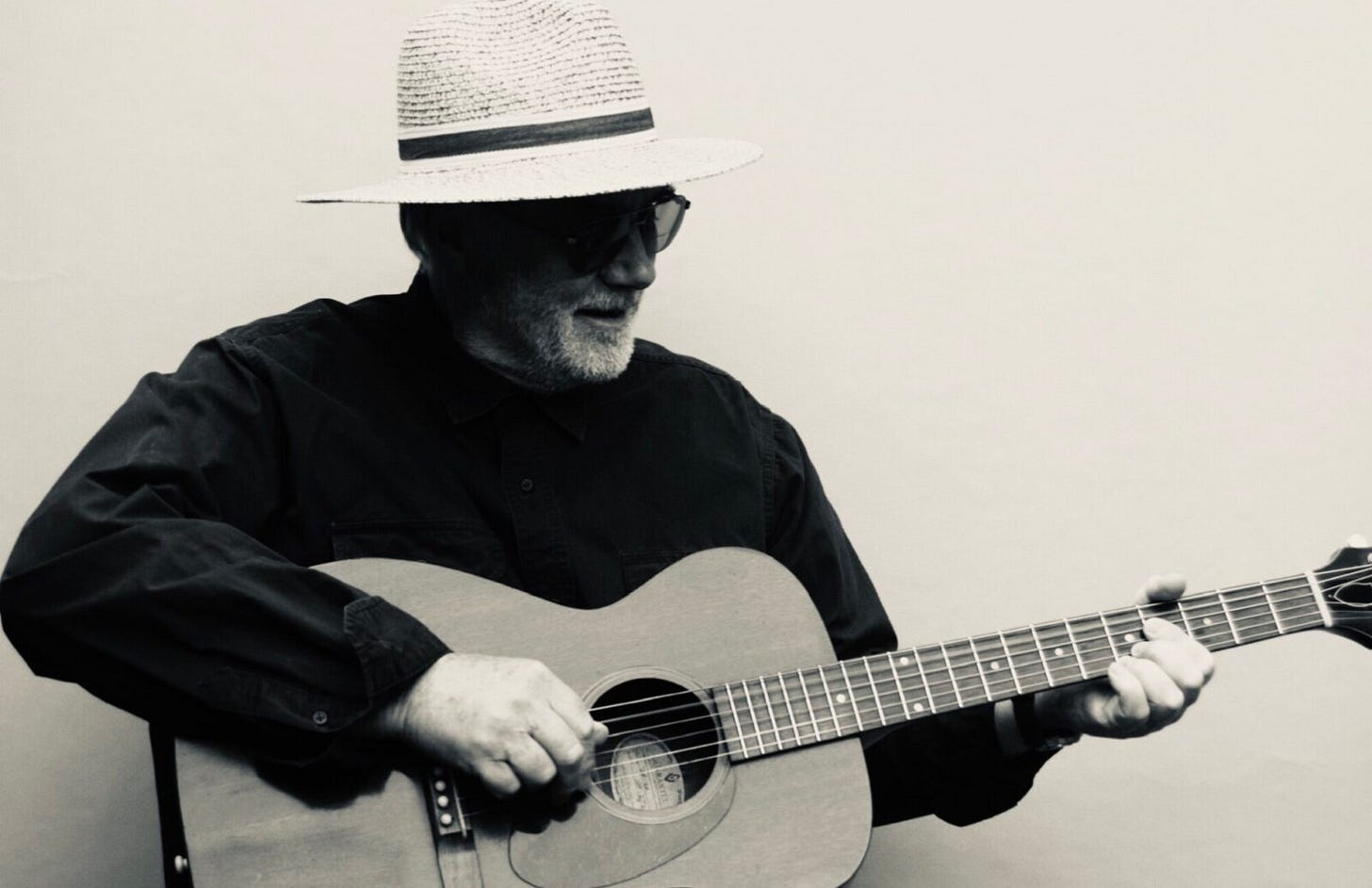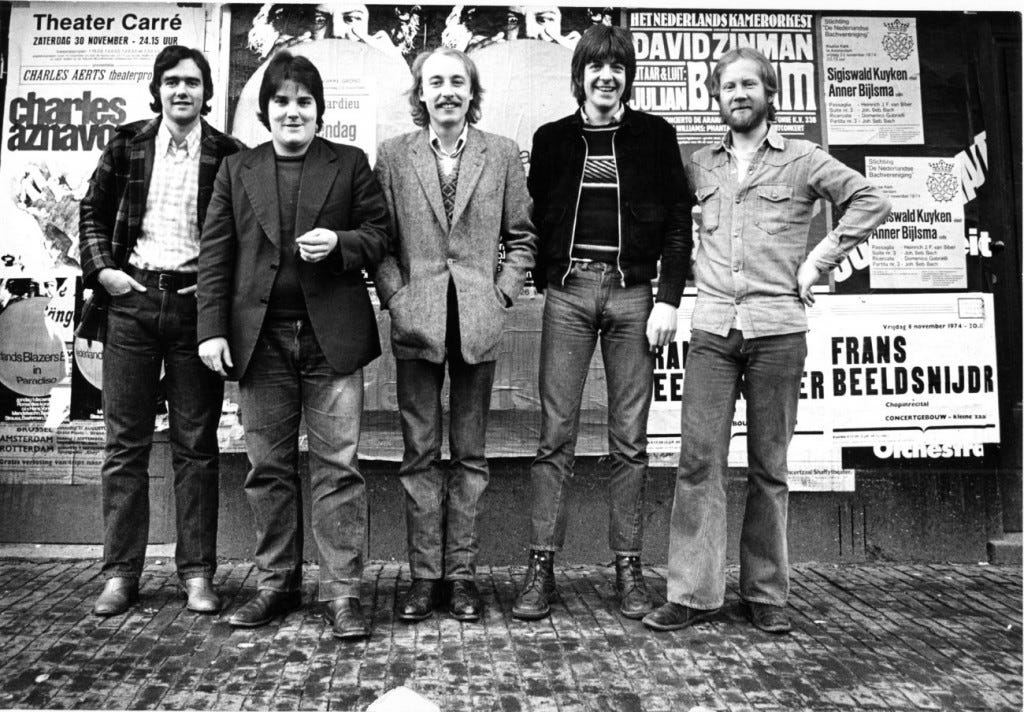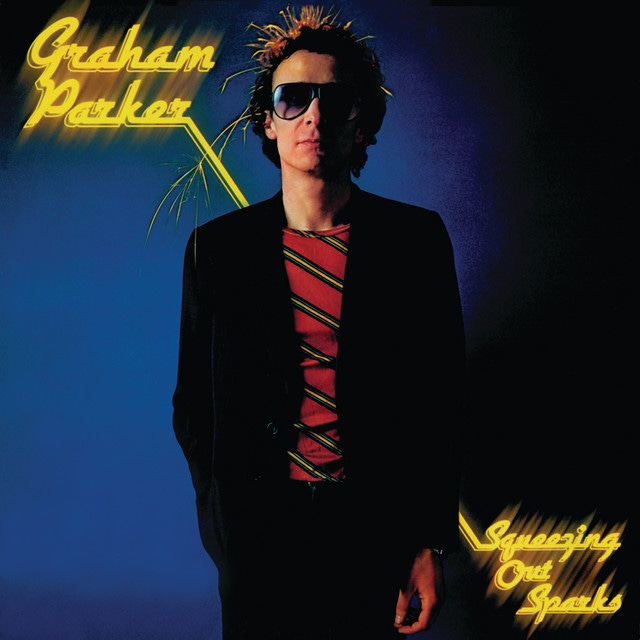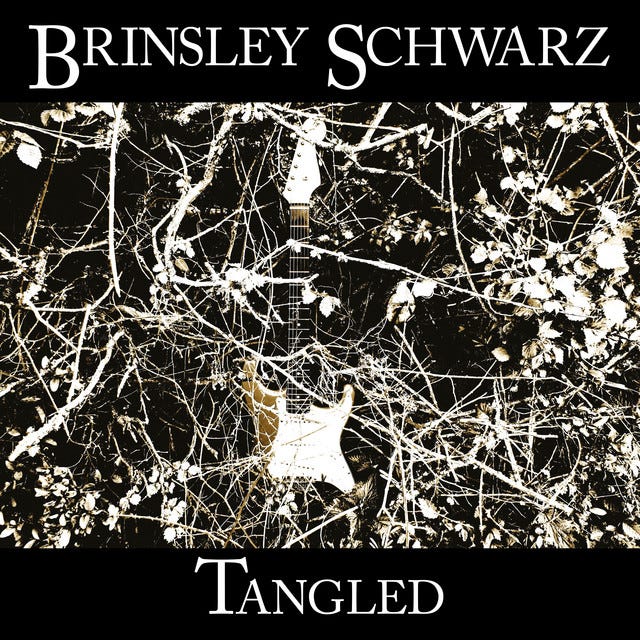5 Questions With: Brinsley Schwarz
The legendary guitarist stops by to chat about working with Nick Lowe, Graham Parker, his upcoming solo record, and more.

Good morning!
Today we’re talking with legendary guitarist Brinsley Schwarz
On Repeat is a 100% reader-supported publication. If you enjoy what you read here and want to support this project, the best ways to do so are to share it and subscribe.
I recently had a chance to chat with legendary guitarist Brinsley Schwarz via email. Many of you are no doubt familiar with his incredible generations-spanning work. For those that might not be, a short primer may be in order:
Schwarz started playing in the ’60s with Nick Lowe in Kippington Lodge. From there, they formed the eponymous Brinsley Schwarz band, with Lowe as frontman. The group soon caught the attention of promoter Dave Robinson, who devised a plan to boost the band into rock stardom.

The scheme involved the band flying to the US to open for Van Morrison, with Robinson also arranging for a planeload of journalists to be at the show. Everything that could go sideways here did, including visa issues for the band and a mechanical delay for the journalists, who spent their time stranded taking advantage of an open bar. The result saw the group arriving on the day of the show and playing a set with unfamiliar equipment in front of journalists, either still drunk or already hungover.
It went exactly as you might expect.
The band returned to England and focused on music, the result being Despite It All, their second record. Constant touring and recording led to a few more albums and even opening for Paul McCartney before eventually breaking up in 1975.
Following the band’s breakup, Schwarz formed Ducks Deluxe before he and keyboardist Bob Andrews joined Graham Parker’s backing band, The Rumour, playing on records like 1979’s Squeezing Out Sparks, and touring extensively.
He then briefly retired from the stage before reuniting with The Rumour in 2011. In 2016, he released Unexpected, his debut solo record. That was followed by 2021's Tangled which included “Storm in the Hills,” a track featured here this past spring.
Before we dive in, I want to thank friend of On Repeat Jay Nachman for connecting Schwarz and me. Simply put, if not for Jay, this wouldn't have happened.
And with that, I'll get out of the way and get right into the interview.
Our chat has been lightly edited for clarity/flow.
Can you tell us about your early musical influences and how they shaped your sound as a musician?
When I was twelve, I heard a record on the radio. It was an instrumental called Apache by a band called The Shadows. I'd never heard anything like it, and, like thousands of teenagers, I immediately wanted an electric guitar. My parents gave me a Spanish acoustic for my birthday and said I might get an electric guitar when I'd learned to play. I could play Apache by the evening of my birthday, but I had to wait a year before we could afford an electric guitar.
By the time The Beatles were changing the world forever, I was listening to every and any music I could. It was all called pop music and included everything from The Beatles to Dylan and Hendrix to James Brown and Motown. In the sixties, it was all an influence, all a big learning experience.
But by the late sixties and early seventies, hugely influenced by our experience at the Filmore East, we moved away a little from English music. We listened to Crosby, Stills & Nash and The Band, and Van Morrison, and as a guitarist, I was into Robbie Robertson, Albert King, and Motown.
Your band was part of the pub rock movement in the early seventies. Can you describe what that scene was like, and how it differed from other musical movements at the time?
After the Filmore East fiasco, we had come home from the States with some stark realizations. The most important of these was the need to be much better than we were; we needed to learn how to play like a band. So we rented a big old 1920s house in northwest London and moved in together-- families and all--built a rehearsal room, and started to play, jamming James Brown riffs and playing any song we felt like.
We carried on playing gigs, which had improved until how we were playing seemed to be at odds with where we were playing. There were college gigs, occasional small theatre gigs, a few clubs, and a few venues, like The Roundhouse in London, but nowhere really relaxed; everywhere was a show.
Then one day Dave Robinson, our manager, and Nick Lowe came back from a night out talking about a U.S. band they'd seen playing in a pub and said we should all go see them. So we did and decided that this was what we should be doing. It was relaxed; they were just playing songs--good songs--a little like The Band with some R'n'B thrown in. The problem was that there weren't many pubs with bands playing. So Dave and I started going 'round town trying to persuade landlords to let us play in their pubs. We had to say we'd play for free until we had upped their takings, which was, fortunately, not long.
It was summer, and we were playing to packed audiences and playing what we wanted to. Pretty soon, other bands like Ducks Deluxe and Bees Make Honey were joining. That's how pub rock started. It wasn't a musical genre; it was more like a venue genre. It was anything that any band wanted to play. The only musical difference was that everyone was playing songs, and there were no long solos.
In your eyes, how has your sound evolved from your first album and what factors influenced those changes?
Well … the music changed, we got better, and we learnt more about how to use a recording studio.
During my time with Graham Parker and The Rumour ( 1975 to 1980) and then with Graham (1981 to 1989), I played in the band under a series of producers and coproduced on two of The Rumour's albums, an album for Carlene Carter, and eventually produced 'Mona Lisa Sister' for Graham and coproduced 'Human Soul' with Graham.
Now I'm producing my solo albums, with 'Unexpected' and 'Tangled' released and my third 'Falling Over Backwards' on the way.
The freedom of having whatever I wish on a track comes with the downside of not having as much input from other musicians, which I've sometimes missed, though the musicians who have come and played with me have almost always played just perfectly.
Your band played countless shows in pubs across England. Do any particular performances or venues stand out in your memory and why?
We actually didn't play a lot of pubs, not countless ones anyway, although we were very active from the beginning. When the press realized that things were changing and there were new kids in town, they took it upon themselves to call it something and came up with 'pub rock.' This meant it was time for us to move on.
The one pub I remember was The Kensington; it was always packed and jumping. Frankie Miller used to get up and sing 'Wild Night' (Van Morrison) and 'Ain't Too Proud to Beg' (The Temptations), and Ruan O'lochlainn, from Bees Make Honey, got up to play sax. There's a paved area out front which was also packed.
It was a great summer, and Kensington gigs were always good, but I don't remember any one in particular. With GP and The Rumour, we had some great gigs--Cloudland in Brisbane was terrific, and we caused a bit of a stir that night.
There were so many, but I remember the performance on the Late Night with Jools Holland TV show when GP and the Rumour played 'Long Emotional Ride.' It seemed emotional, and a calm had settled over us. It was a special moment.
How did you approach the recording process for your albums, and how did you balance the desire to capture your live sound with the need to create polished studio recordings.
We rarely used the same studio more than once; Rockfield and Eden were exceptions. And apart from that, we tried something different as we went along. I tried to have my amp in a room or space of its own, and at Eden, this meant I recorded in the stairwell. I never put the mic at the edge of the speaker, always in the middle, one mic about a foot away and one in the room. I think the best-sounding record [Graham Parker and The Rumour] made is the most recent 'Mystery Glue.'
James Hallawell and I recorded 'Unexpected' and 'Tangled' in his little studio in Richmond (Surrey) and are planning to get together to finish Falling Over Backwards soon.
We put down a guide vocal and acoustic and a click track. The drummer comes along, and records to that, and James and I add the rest. James has a selection of old tube mics and tube preamps, all of which sound terrific. And we just record away. It's very relaxed and easygoing, and I love the results. We've never preferred polished recordings over the take that is obviously the best take!
You’ve played with other musicians over the years, including Nick Lowe, Elvis Costello and Graham Parker. Can tell us about your favorite collaborations and what you’ve learned from working with other musicians.
I've not really played with a lot of other musicians. I co-produced an album of Carlene Carter's with Bob Andrews, a fellow member of The Rumour. The Rumour played on that album, and we opened for her and backed her in concert.
I made some guest appearances with Stiff Records artists, mainly playing sax. I joined Ducks Deluxe for a short while in 1975 and again around 2010/2011.
In 1981-ish, after Graham and The Rumour split, The Rumour did, too, so I toured a little more with Carlene and also with Garland Jeffries, and I played on an album with Japanese singer-songwriter Motoharu Sano. But then I began working in a guitar store repair shop. I always wanted to make myself available to play with Graham again, so I never looked for work. And I rejoined Graham again in the early '80s.
There was also one time I jammed with Elvis on piano, Paul McCartney, Pete Thomas of The Attractions on drums, and Scott Gorham of Thin Lizzy on the other guitar.
To piggyback on that, any stories or thoughts on the making of Squeezing Out Sparks?
It was decided that the band (The Rumour) would stand back from offering song arrangement ideas and let producer Jack Nitzsche guide us. So we were in the studio all set and ready to go; Jack had us playing through things and spent some time listening and making sure we were happy with where we were and how we would record.
But a couple of days later, Dave Robinson, who managed both Graham and The Rumour, asked how it was going. We kind of had not much to report. Dave said he'd have a word with Jack. The next day Jack was like a whirlwind, all enthusiasm and ideas. Graham, Martin, Andrew, and Steve put drums, some guitars, and vocals down, and days later, my turn came. Jack said to get myself together and make sure I was happy with my sound and everything. And when I said I was, he said okay, you have one shot per song. I was saying, 'Sorry, what?' when I heard Steve counting in the song in my headphones. So I played once, and that's what's on the record. He said okay, next track, and so it went. I messed up the solo in 'Passion is no Ordinary Word.' He liked what I was trying to do and gave me another go. But the rest was one shot.
The one great thing Jack did, was he got us all 'round the piano to talk about 'Love Gets You Twisted,' which we were playing a bit like 'Local Girls,' medium tempo, and he was saying to slow it down. Think 'Cathy's Clown' (Everly Brothers), he said, talking to Bob about the piano part. Jack suddenly whirled on me and said, 'Give me a hit guitar line.' I played what was in my head, and that's what's on the record.
When I was recording ‘Tangled,’ I suddenly had the urge to try to record ‘Love Gets You Twisted’ and thought of slowing it down more than we had on Sparks, and then I had the idea to add the two choruses back to back after the solo.
They work together lyrically, and later, while we were listening back, I sang the Everly Brothers-type harmony. It’s one of my two favorite Graham songs. He likes my version, and that makes me happy.
Many artists have cited your band as a major influence, including members of the punk rock movement. How does it feel to have had such a lasting influence on music?
Well I didn’t know that. I guess we’re very chuffed to hear that. We have always tried to put music first and still are.
What advice would you give to up and coming musicians who are trying to find their own sound and build a following?
Well, I’m finding it difficult to make headway, to get a track played on the radio, whatever that is nowadays, so I don’t know that I’m a person to ask. Finding your own sound is the easy part, especially when there is so much comprehensive equipment out there. Building a following? Not so easy. You just have to believe in yourself, follow your heart, oh, and be nice to your audience.
Paul McCartney once told me that, as a performer, you owe something to your audience. They’ve come to be entertained, paid to be entertained, and it’s your job to do your best to entertain them. You can be having the worst time, everything going wrong, feeling bad, ill, whatever, but when you walk on that stage, you can’t let it show; there are no excuses.
How has your approach to music changed over time, and what keeps you inspired to keep making music?
I’ve learned a lot about music, but not nearly enough. With music, you can keep on and on learning. But I think I’m more open to things I wouldn’t have been when I was younger. For example, there’s a lot of great movie theme music with lovely melodies like “The Day After Tomorrow” and “Gladiator.” I’ve also become a little entranced by 6th chords, inside or out.
Guitars keep me inspired to keep playing. I only have to pick one up and can noodle away for hours. And what could be more fun than making your own records?
I want to ask about your latest record ‘Tangled’ for a second. Several places mentioned that while recording ‘Unexpected,’ you and your producer more or less just kept going with the result being an entirely new album. Did you know you had enough material for an entire second record, or was that a bit of a happy accident?
Okay, I'm a little shaky on dates, but this is what happened. During the 80s, I was either recording and touring with Graham or working at the guitar store fixing guitars. I wasn't writing songs, although I did make up some funny little instrumental things, blues and a little jazzy, which I used to play to check out how a guitar played and felt before fixing it and the same after I'd worked on it to check intonation and so forth.
In the 90s, I stopped working as a musician and got into modifying amps as well as fixing guitars. I occasionally tried to write a song, had an idea but could never develop it into a complete song. I had a verse of 'Game On,' which is about a little comedy TV show of the same name, the song is about one of the characters, and I had a vaguely anthemic instrumental little tune. And that's how it was; I was not trying to write songs and had pretty much given up on the idea of playing again.
Then I heard 'Two Against Nature' by Steely Dan. I could not stop listening to it, I stopped listening to anything else, and then one day, driving home, I wrote a whole song; it took about ten minutes, and then I couldn't stop. I finished 'Game On' and wrote a song to the anthemic tune for a niece who was getting married in Sweden.
By the time Graham and The Rumour had reformed to record 'Three Chords Good,' I had written about fifteen songs, and about a year later, we were on tour, and James Hallawell, who had played (keyboards) with Graham, me, and Andrew Bodnar (Rumour bassist) during the late '80s came to the show in London and came backstage to say hello. We got to talking, and he told me about his studio and said I should go one day and record something. So I did, and we recorded 'Seal it with a Kiss,' which is on 'Unexpected.'
While I was strumming my acoustic and he was getting a sound together, I started to play bits of some of my other songs, which he recorded. He thought they were good, and we figured we could make an EP, so we started that. When it came to getting a drummer in, James said we'd probably be charged for a whole day, and while he was with us, we could put drums on more tracks, so we put down some more basic tracks. Later, when we were nearly finished with what we thought would make a good album, we realized that a couple of songs didn't sit quite right with the rest. I'd been on tour and had written more songs, so we put basic tracks down of some of those, asked a drummer in, and put drums on what we had.
So now we had an album and some leftover tracks part done. The leftover tracks were simply a little different in feel or lyrically. Back in the 20th century, we treated an album as a whole thing, and there were two sides; we used to listen to the entire thing and enjoy the cover artwork and the inner sleeves. Being mindful of that, I tried to make 'Unexpected' and 'Tangled' like that.
Now I'm halfway through my third album, and I have more new songs.
I recently featured your ‘Storm in the Hills’ track. In that write up I said ‘Schwarz is known as one of the originators of the pub rock sound and ‘Storm in the Hills’ sounds like someone still clearly wearing the title. This is a barrel piano and a boogie beat, no frills classic rock. Would you agree of that description of you and/or the song. Disagree?
I can see how that might be true, but as I said before, there really isn't a pub rock sound, just whatever someone would like to play and found that a pub was a place to do it. Because this caught on, there were suddenly many more venues for bands who, for whatever reason, could not get themselves heard to play. We covered a lot of genres, music from the '50s and '60s, Motown, Soul, Blues, Pop, Reggae, our own songs, R'n'B (as it was back then), etc.
I'm a little surprised that out of all the interviews and podcasts I've done in the last couple of years, I haven't been asked much about my lyrics. I would have thought that maybe, 'You Miss Again,' 'George,' 'You Can't Take It Back,' 'Storm In The Hills,' 'Crazy World,' and 'It's Been A Long Year' might have aroused some interest. They are about human frailties or coping with these troubled times.
Finally, what’s next for you and your music career? Do you have any upcoming projects or tour plans?
Yes. I hope to finish ‘Falling Over Backwards’ next month and then gigging and touring is a possibility, but it’s not easy and it’s expensive, but I’ll be trying.
Brinsley Schwarz- Tangled, 2021
Click on the record to listen on your platform of choice.
You can connect with Brinsley Schwarz and check out his music in the following places:
Bandcamp | Spotify | Instagram | Facebook | Fretsore Records |
5 Questions:
1. Describe your musical taste in one sentence.
Like it is for a lot of people, most of my favorite music is from my teenage years.
2. What music played in your house(s) growing up?
'50's and '60's pop and rock n roll and R&B. My mother was on stage when she was a teenager and loved 30's and 40's film and show music. Bing Crosby, etc.
3. What are you listening to these days?
Beatles, Little Feat, Steely Dan, The Band, Randy Newman, Van Morrison, etc.
4. What are your 5 Desert Island Discs?
Beatles- Abbey Road
Steely Dan- Two Against Nature
Little Feat- Feats Don’t Fail Me Now
Randy Newman- Good Old Boys
The Band- The Band
5. If you could collaborate with any artist/band, who would it be?
Paul McCartney
Thanks to Brinsley Schwarz for stopping by, and thank you for being here,
Kevin—







As a long time listener of Brinsley Schwarz, I was thrilled to read this interview. Between him and the guys that played with him and around him in pubs I developed a taste for the British version of New Wave Music. Elvis Costello, Elton Motello, Nick Lowe, Dury and the Blockheads, etc. It was enlightening to hear his take on music in general and who influenced him and who he is listening to.
Awesome! i’ve been eagerly awaiting this one!